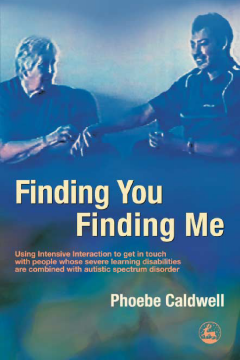
Additional Information
Book Details
Abstract
Phoebe Caldwell's remarkable new book makes accessible for the first time the complex, intricate inner and sensory worlds of people whose learning disabilities are combined with autistic spectrum disorder and, often, difficult-to-manage behaviour. Based on many years of working with such people, many of whom have withdrawn into a world of their own, she explores the different sensory reality they experience, showing it to be infinitely more complex and varied than is widely understood. She introduces a practical approach known as Intensive Interaction, which uses the body language of such people - who have hitherto largely been regarded as unreachable - to get in touch with them, giving them a way of expressing themselves which shifts their attention from solitary self-stimulation to shared activity. The outcome is not only a marked improvement in behaviour and ability to communicate but, more important, many parents will say 'they are just much happier'.
Covering not only the practical aspects of introducing this technique, but also the thinking behind it, this landmark book has much to say on behalf of a group that has in the past largely been denied a voice, and will open new avenues for both practice and research. It is invaluable for parents, carers, and all who work with this group.
Phoebe Caldwell clearly describes intensive interaction as a means by which a parent , support partner, therapist, community worker, advocate or simply someone who would like to be a friend can create two-way human communication, Finding You Finding MeThe book has been acclaimed as a landmark, speaking on behalf of a group who in the past have been denied a voice and who live in a non-verbal world and have serious learning disabilities or severe behavioural distress.This book is a must for anyone researching or seeking to support individuals who are non-verbal or on the borderlines of speech, with serious learning disabilities or severe behavioural distress. Finding You Finding Me introduces a practical approach to communication. Appendix B contains a very concise overview, 'The Way In - Using Intensive Interaction'. There is a wealth of researched information throughout the book. The case studies and testimony of practitioner and partner demonstrate as stated by the author that individuals can grow together in a rewarding mutual partnership experiencing along the way fun and, yes, joy!
Good Autism Practice
Caldwell does a nice job of portraying the stresses that are associated with this combination of conditions and provides excellent graphical representations (e.g., moving the attention from one's self to another person)... Recommended, then, for academic libraries with autism collections.
Library Journal
Caldwell has done some of the most innovative work on autism in Britain for years, and this book describes how she works and the basis for the therapy she has developed. The case studies are intensely moving, and it is impossible to read this without facing some fundamental questions about the nature of consciousness, of relationship and communication. In writing as speaking, she touches some very deep emotions.
Times Literary Supplement, Dr. Rowan Williams Archbishop of Canterbury
The book is interesting to read and structured in a logical way. The examples drawn from clinical practice give the book an immediate relevance to practising clinicians. It challenges the reader to reconsider what working in a 'client-centred' way really means when working with people with ASD. Better still, it provides a range of ideas and understanding which could help other clinicians make breakthroughs in a building working relationships with people with ASD. This book highly recommended.
British Journal of Occupational Therapy
this book focuses upon the intricate inner and sensory worlds of people whose learning disabilities are combined with ASD, while introducing a non-invasive way of making a connection with them. Well worth the read.
Children, Young People and Families
Phoebe Caldwell has worked for over 35 years as a practitioner with children and adults with autism and people whose severe learning disabilities are linked with behavioural distress. She was a Rowntree Research Fellow for four years, trains management, therapists, practitioners, parents and carers in her successful approach to Intensive Interaction. She is employed by the NHS Social Services and Community and Education Services to work with difficult-to-provide-for individuals. In 2009 she was awarded the Times/Sternberg Award for pioneering autism treatment and is soon to be awarded a DSc by the University of Bristol.
Table of Contents
| Section Title | Page | Action | Price |
|---|---|---|---|
| Preface | |||
| List of Figures | |||
| List of Tables | |||
| PART ONE: THE PARADOX OF POVERTY | |||
| Chapter One: Poverty and Priorities 3 | |||
| Chapter Two: The Poor and the Potentials | |||
| Chapter Three: Who Gains and Who Loses? | |||
| PART TWO: LIFT IRRIGATION AND THE POOR , | |||
| Chapter Four: Access to Water through Groups | |||
| Chapter Five: Access to Water through Markets | |||
| Chapter Six: Practical Policy | |||
| Chapter Seven: Forestry for Livelihoods 143 | |||
| Chapter Eight: Why Small Farmers Don't Plant Trees | |||
| Chapter Nine: A New Charter for the Poor | |||
| PART FOUR: PRACTICAL STRATEGY | |||
| Chapter Ten: Analysis and Action |
